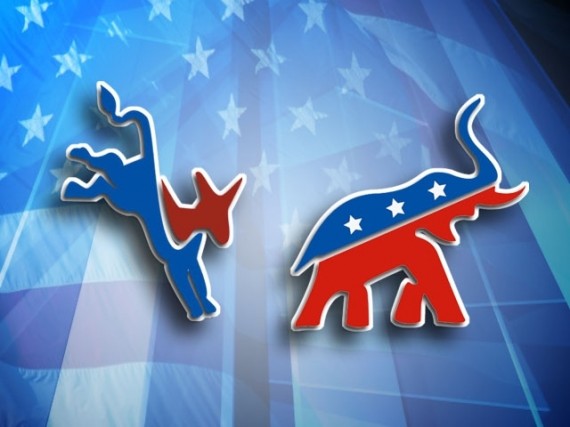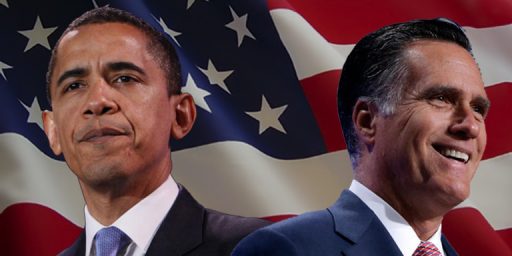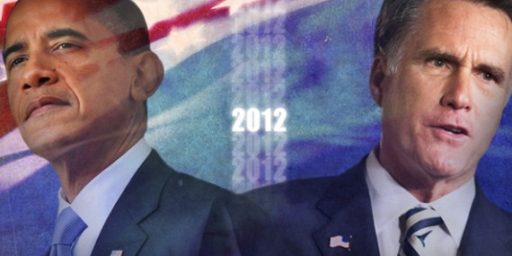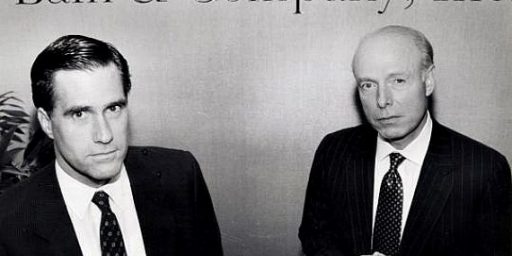The “Crisis Election” Canard
Once again people are saying that 2012 is an election year akin to 1860 or 1932. Once again, they are wrong.
Returning to a theme that we’ve actually seen several times before, Peggy Noonan asserted on Friday that the 2012 elections are a “crisis election” on a par with the elections of 1980 or 1932:
The 2012 presidential election is unusual. It is a crisis election like 1932 or 1980, with the American people knowing we’re at a turning point and knowing that who we pick now really matters. But crisis elections tend to bring drama—a broad sense of excitement and passion. We’re not seeing that this year. We’re not seeing passionate proclamations from supporters of one candidate or the other that their guy is just right for the moment, their guy is the answer. I’m speaking of the excitement of deep belief: “FDR will save the day.” “Reagan will turn it around.”
Ironically, after that opening paragraph discussing how this is a “crisis” election, Noonan spends the rest of her column trying to ponder the reasons why neither the major party candidates nor the American people appear to be treating this as if it were such an election, and she comes up with this:
[P]eople know that what America needs right now is the leadership of a kind of political genius. Second, they know neither of the candidates is a political genius.
That’s why it seems so flat when you talk to voters or political professionals.
This kind of reminds me of the point that James Joyner made some time ago when he pointed out that no candidate for President seems Presidential until they actually become President. In any event, though, it’s the “crisis election” meme that interests me, because it’s a theme that I’ve seen, mostly from the right, for months now. To listen to some of these people, you’d think that the 2012 Presidential Election is as crucial to the survival of the Republic as the Election of 1860, or that it will determine the future course of the nation as definitively as the elections of 1800, 1828, 1860, 1932 and 1980 did.
Steven Hayward takes the argument that Noonan laid down, and adds this:
Let me double down on Noonan’s public memo to Romney and his campaign: there’s a Reagan-style landslide sitting on the table for you if you can figure out how to step up and grab it.
I’ve seen this argument that Romney has the potential to win the election by a landslide from several conservative bloggers in recent weeks, but I’ve honestly got to say that I don’t see where it’s coming from. Yes, the economy sucks and it’s not likely to improve very much between now and November. Yes, the President’s approval ratings are under 50% and, on the economy, even lower. And, yes, poll after poll has shown for the past three years that the American public remains pessimistic about the state of the economy and the direction of the country. However, we live in a highly polarized political environment where large segments of the public have essentially already made up their minds about who they are going to be voting for. Based on the available evidence, it seems fairly clear that the 2012 election is going to be close no matter who wins. If Obama wins, it’s likely be by a smaller Electoral College and Popular Vote margin than he had in 2008, which would be an historical oddity in itself. If Romney wins, it’s likely to be by the slimmest of Electoral College margins. The idea that the circumstances exist for the kind of landslide we have not seen since Reagan defeated Mondale in 1984 is just wishful thinking unsupported by any evidence.
Getting back to the “crisis election” meme, though, Daniel Larison makes this point:
Perhaps the American people don’t see the election as a “turning point” at all. If they don’t, they would be right. Once we get past some of more the obvious disagreements on foreign policy, this is an election contested by two candidates in general agreement about the size and domestic role of government. Rhetoric about the Ryan plan notwithstanding, does anyone believe that Romney significantly differs from the “big-government conservatives” of the previous administration on the role of government? Of course not.
It goes even further than that, of course. If Obama wins, all of the available polling evidence tell us that he’s going to face a House of Representatives that is still controlled by the Republican Party. Quite possibly, he may also end up with a Senate that has a narrow Republican majority or, at the very least, an even narrower Democratic majority than we have at the moment. If Mitt Romney is elected, and even if the GOP does gain majority control of the Senate, it will be a razor-thin majority that will rely for its support on the votes of at least one (Murkowski) and possible two (Angus King) Independents. With the cloture rules likely to remain in effect, this means that President Romney will still have to deal with the Democrats just as Obama would have to deal with the Republicans. Under these kind of circumstances, the idea we’re going to see revolutionary change without some kind of political compromise being made is simply utopian absurdity.
And yet, there are those on the right who tell us that if Barack Obama is re-elected the Republic is doomed. As I noted on New Year’s Day, that is simply absurd:
Except perhaps for Aaron Burr and John Breckinridge (the candidate who came in second in the Election of 1860), I can’t think of a single major party nominee in our history who it could be fairly said would have been a grave danger to the Republic had they won the election. The only purpose that engaging in such rhetoric serves is to rile up the partisan masses, and while that’s a grand old American tradition (just look at the politics of the 1820s or late 19th Century for proof of that) it seems as though we’ve entered an era where the partisan nature of campaigning has made governing itself impossible. If you believe your opponent is not just wrong, but evil and a threat to the nation, then compromise is impossible. The fact that it isn’t true doesn’t really matter.
Re-electing Barack Obama won’t mean the end of America. In fact, if recent history is any guide it’s quite likely that a second Obama Term will be even more of a let down for his supporters than the first one has been
To some extent, of course, one can chalk much of this talk up to election year rhetoric. I’ve been following Presidential elections since 1976 when I was in 3rd Grade (yes, that early) and each one has included people saying that said election was the most important election in American history. Obviously, each time we vote for President we influence history, and it’s impossible to say how history would have been different if a losing candidate had won actually won a given election. Even taking that into account, though, it seems rather obvious that the 2012 contest between Barack Obama and Mitt Romney isn’t nearly as definitive as the partisans on either side would like us to believe. Re-electing Barack Obama will not lead to American becoming a replica of a European welfare state. Electing Mitt Romney will not turn America into some Dickensian version of the perverted vision of Laissez Faire capitalism that the left likes to scare people with. We’ll muddle along for the most part, and we’ll either figure out how to work out the partisan differences that exist regarding fiscal and economic policy, or won’t and we’ll face the consequences in the not-too-distant future. That is certainly important, but to be quite honest it’s a fate that we will reach if we fail to act properly regardless of which man occupies 1600 Pennsylvania Avenue on January 20, 2013.







from Daniel Larson:
“Rhetoric about the Ryan plan notwithstanding”? Well, what’s that? Sound to me like he’s saying that, except for the Ryan stuff, this is business as usual. Doesn’t seem like that to me.
I’d say that if the GOP retains the wide margin in the House, takes the Senate and Romney wins, that the Ryan Plan becomes a bit more possible. Romney and Ryan want to cut the top tax rate from 34% to 25%, begin the privatization of Medicare, etc … Seems like a pivotal election to me
If Romney is elected we will go back to growing Government and exploding deficits…like all Republicans have done before him. His policies are BUsh 43 on steroids. Tax Cuts for the wealthy. Program and investment cuts that affect the middle class.
Romney will appoint more activists to the SCOTUS…like Scalia, willing to reverse long held precedent for political gain.
On foreign policy Romney has surrounded himself with Bush foreign policy retreads…we will revert to the Neo-Con way…nation building and torture.
Does any of that describe a crisis?
I think if you look big picture at where we were in 2001 and the trajectory that Bush 43 began…and project that same trajectory from where we currently stand…yeah…you could legitimately call that a crisis.
“Rhetoric about the Ryan plan notwithstanding, does anyone believe that Romney significantly differs from the “big-government conservatives” of the previous administration on the role of government? Of course not.”
While the Romney who ran for office in 1994 and 2002 was little different from other Northeastern Republicans of the Nelson Rockefeller school, that candidate is not running this year. If he were, he would be touting his health plan, instead of running away from it as fast as he can. He would be denouncing the Ryan budget instead of running on it. And he would still support abortion rights, instead of opposing it.
Instead, Romney has calculated that kowtowing to the Republican base is the way to get elected. The question then becomes which Romney would we get as President, and I see no reason to believe that Romney has sufficient backbone to take back his campaign rhetoric and govern as a moderate in the face of a party base which views any deviation from party line as treason (just ask John Roberts).
“With the cloture rules likely to remain in effect, this means that President Romney will still have to deal with the Democrats just as Obama would have to deal with the Republicans.”
Sorry, but this makes me wonder which country’s politics you have been observing. Even if the Republicans do not decide to selectively use the “nuclear option”, Romney would need to deal with the Joe Manchins and Bill Nelsons of the Senate, as the Democrats do not present a united front. Obama has needed to deal with people like Olympia Snowe who voted for Obama’s healthcare proposals in Committee but not on the floor of the Senate, and with a host of Senators who ceased to support proposals they have advocated for years (such as cap-and-trade) the moment Obama supported them, since they know that crossing the party line is fatal.
@Moosebreath:
Historically, the Democrats are much more effective at presenting a united front when they are the minority party.
That said, in the last few decades, Republicans have arguably been the more disciplined of the two in presenting untied fronts — though this wisdom is increasingly being challenged in the House.
mattb,
“Historically, the Democrats are much more effective at presenting a united front when they are the minority party.”
Not sure which historical periods you are thinking about, but as you note below, that’s not true in recent times.
“That said, in the last few decades, Republicans have arguably been the more disciplined of the two in presenting untied fronts — though this wisdom is increasingly being challenged in the House.”
The same House which had more Democrats vote for the Bush tax cuts than Republicans vote for Obama’s stimulus? The same House which had more Democrats vote for No Child Left Behind than Obama’s health plan (which was a Republican idea in the first place)? Which votes in recent years do you think run counter to this?
BTW — I think most historians put the election of 1896 on the list of critical elections, in that the choice between Bryan and McKinley was equally stark.
Of course this election is the most important in history. Every presidential election is — until we get enough historical perspective to decide which ones were critical, and which were only very important.
For those keeping track at home, this will be — by my rough calculations — the 56th presidential election in our history. That’s an incredibly small number for over 2 centuries of history.
Quite correct. I’ll throw out a challenge I have yet to have anyone respond to. What significant thing has Obama done that Richard (We’re all Keynesians now.) Nixon wouldn’t have done? Or mostly actually did do.
(OK, the Nixon quote’s wrong, but it’s what everyone thinks he said, and it’s close enough to be fair paraphrase.)
And C. Clavin is right. Look at the rhetoric, and the advisers, and at how frankly nuts the Republican party has become. Romney would do what Harry Reid’s seventeen billionaires tell him to do. A Romney term would be W all over again. Bush fought and lost two wars, created the current deficit, and nearly crashed the banking system. And all those failures flowed straight line from Republian ideology.
Peggy Noonan still is being published?
In any event, obviously this election season doesn’t compare to 1932. Despite the best efforts of the Democrats we’re not anywhere near 25% unemployment nor are we going to hit 25% unemployment, even if Obama is reelected and even if the Democrats retain the Senate.
But still it’s a very important election. I hate to say this but I have to agree with Noonan that it’s the most important election since 1980. There are a lot of eerie parallels. The only major difference, ironically enough, is that while Carter was a disaster on foreign policy Obama in large part has been a brass-knuckled, kick-ass machine. That’s a good thing. Domestically, speaking though, Obama’s policies are so bad they numb the mind. This November either we’ll get back somewhat on track or we’ll continue in earnest the big slide.
When times and trends are good, it makes some sense to support gridlock. When it ain’t broke, don’t fix it.
When it is broke?
I wish we had a better chance at a pragmatic majority, pragmatists from both parties woul be great, but I fear we’ll choke on our polarization for another 4 years. It is a bad time for it.
Its an important election. When you look at Doug and the conservatives on the thread, they are hoping and praying that the Democrats retain enough strength from passing their nut-job agenda like repealing the ACA and replacing it with nothing, / turning Medicare into a voucher program and passing the Ryan budget.
Moreover, should the Republicans win, they will go back to trying spur economic growth through austerity. That didn’t work 1929-1933 and it ain’t gonna work now. Obama will ( hopefully) try a second round of stimulus (should have been tried in 2010) and prompt Bernanke to get his head of his ass and try monetary stimulus again. The American people deserve better than the Hoover Admin Round II which is what they’ll get with Romney. And let’s not even go into all the anti-gay, anti-abortion, and anti-immigration craziness that would be be coming out of a big Republican win…..
“…This November either we’ll get back somewhat on track or we’ll continue in earnest the big slide…”
WTF are you talking about? The big slide stopped on Obam’s watch..I guess you have forgotten about the 9% contraction during Bushes last quarter..the Dow at 7000…700,000 people a month losing their jobs.
If your opinion is based on nonsense…then your opinion is…well I think you see where I’m going…
@Tsar Nicholas: Well of course Peggy Noonan is still being published; National Review still exists in a sadly devolved form and there are still a few nut cases worrying about “Red China”. As I’m sure you know. So don’t pretend to have a higher sensibility than everyone else in the room, Mr Romanov. It only makes you look like a jerk. Just say what you have to say without attempting to be cute and, if you can, support it with data.
With the Euro teetering on the brink of extinction and the Chinese economy possibly having shot it’s wad by building ‘ghost cities’, there is a serious possibility that we are not that far from 1932. And with the Ryan Budget and similar so-called-conservative measures being forced from the mouth of the present Repub nominee, we might be looking at Herbert Hoover.
If things over which we have no control — or very little control — go well, you are correct, Mr Mataconis. The nation will likely muddle along. But if things go badly, this could indeed be looked back on by future historians as a critical election.
@Moosebreath:
I should have specified in the Senate vs the House.
The house is always a mess, and typically much more of a mess on the Democratic side as it’s historically been the “coalition party.”
I realize you may object to my mentioning the Senate as well. As I have said in the past, the current Republicans have utilized the technologies of procedural obstruction more than any other political party in recent US history. However, should control of the Senate go to them (along with the House and the Presidency), it is my expectation that you will see the Democrats continuing that particular trend (for better or worse).
The game has changed in the last few years.
mattb,
I think the Democrats have been more unified in the Senate than in the House, but still less than the Republicans. Even an apostate like Arlen Specter was more likely to vote with Republicans than Ben Nelson is with the Democrats. And there are more Democrats who are wobbly than Republicans.
And while I expect Harry Reid will try to be as obstructionist as Mitch McConnell has been, his caucus may not let him. I expect at least half a dozen Democrats to be reachable on just about everything short of repealing Social Security. What was the last significant issue that got 6 Republicans to support it?